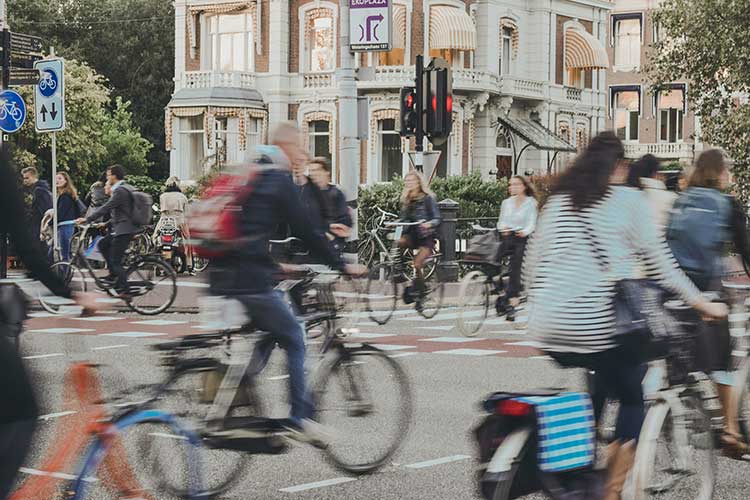As the world becomes increasingly aware of the environmental impacts of everyday actions, college students across the globe are stepping up to champion sustainable practices. One area where this is particularly evident is in their choice of transportation. With a growing recognition of the need for eco-friendly commutes, cycling has emerged as a preferred mode of travel among the student population. This shift is not only contributing to a reduction in carbon emissions but is also fostering a healthier, more active lifestyle.
Amid the rigors of college life, where managing studying, assignments, and the quest for an online essay writer to assist with overwhelming academic workloads is commonplace, students are finding innovative ways to incorporate sustainability into their daily routines. Cycling to and from class, library, or study groups is becoming a popular choice, reflecting a commitment to environmental stewardship and personal well-being.
The Rise of Bike-Friendly Campuses
Many colleges and universities are recognizing the importance of supporting sustainable commuting options for their students. Initiatives such as bike-share programs, secure bike parking, and the development of bike lanes on and around campus are becoming more prevalent. These efforts not only encourage cycling but also make it a feasible and convenient option for students. In addition to infrastructure improvements, educational institutions are integrating sustainability into their curriculum and campus culture, emphasizing the importance of eco-friendly practices among the student body and faculty alike.
For instance, the University of California, Davis, has long been hailed as one of the most bike-friendly campuses in the United States, boasting an extensive network of cycling paths and bike repair stations. Similarly, the University of Copenhagen in Denmark offers a bike loan program for international students, promoting cycling as an eco-friendly and cost-effective way to navigate the city. These programs not only facilitate cycling but also embed the practice into the fabric of campus life, making it a norm rather than an exception.
Benefits Beyond the Environment
The benefits of cycling extend far beyond its positive impact on the environment. For college students, it offers a practical solution to the common challenges of limited parking and congested roads. Furthermore, cycling provides significant health benefits, including improved cardiovascular fitness, muscle strength, and mental well-being. The routine of cycling to class or around town instills a sense of discipline and time management, qualities that are invaluable in academic and personal development.
Cycling also offers a unique way for students to connect with their surroundings. It encourages exploration and a deeper appreciation for the campus and local community. This connection fosters a sense of belonging and engagement, enriching the college experience. The act of cycling itself can be a meditative and reflective practice, offering students a moment of solitude amid their busy schedules, which can be particularly beneficial for mental health and academic creativity.
Overcoming Challenges
Despite the many benefits, some students face challenges in adopting cycling as their primary mode of transportation. Issues such as bike theft, inclement weather, and the need for improved infrastructure can deter potential cyclists. However, colleges are addressing these concerns by implementing secure bike storage, offering cycling workshops, and working with local governments to improve road safety for cyclists. Many institutions are also advocating for policy changes to create more bike-friendly cities, demonstrating a commitment to not only supporting student cyclists but also influencing broader societal shifts toward sustainable transportation.
The support from universities in overcoming these hurdles is crucial in maintaining and increasing student participation in cycling. Providing resources such as weather-appropriate gear recommendations, safety tips, and community cycling events can significantly enhance the cycling experience. By actively addressing these challenges, colleges can ensure that the cycling culture on campus continues to thrive, paving the way for a more sustainable and healthy future for their students and the community at large.
Fostering a Community of Cyclists
Creating a supportive and inclusive cycling community on campus is essential in encouraging more students to adopt this eco-friendly mode of transportation. Colleges and universities are playing a pivotal role in bringing together students of all cycling abilities through clubs, events, and advocacy groups. These communities provide a platform not only for sharing tips and routes but also for voicing collective concerns and suggestions for campus and local infrastructure improvements.
Educational institutions are facilitating mentorship programs where experienced cyclists can guide beginners on safe riding practices, maintenance skills, and route planning. This peer-to-peer learning environment fosters a sense of camaraderie and mutual support, making cycling more accessible and less intimidating for newcomers. Special events like bike-to-school days, group rides, and cycling challenges add a fun and competitive element to cycling, further embedding it into the student culture.
Conclusion: Pioneering a Sustainable Future
As college students continue to lead the way in sustainable commuting, they are setting a powerful example for their peers and the broader community. By choosing to cycle, students are not only contributing to a more sustainable planet but are also reaping the benefits of a healthier, more active lifestyle.
In navigating the challenges of academic life, from managing assignments to seeking out the best research paper writing service, students are demonstrating that it is possible to balance educational pursuits with a commitment to environmental and personal well-being. Their pioneering efforts in sustainable travel are paving the way for a greener, more eco-conscious generation.
Author Bio
Nicole Hardy, a distinguished journalist in the realms of education and the arts, is celebrated for her thorough and discerning coverage of performing arts education. Her career, which extends beyond ten years, has solidified her status as an authoritative figure in this domain. Hardy is praised for her thorough analyses and captivating writing manner. She earned her Master’s in Journalism from the University of Arts, with a focus on arts, culture journalism and now she provides amazing student friendly content on News.EssayHub.com
No products found.
















